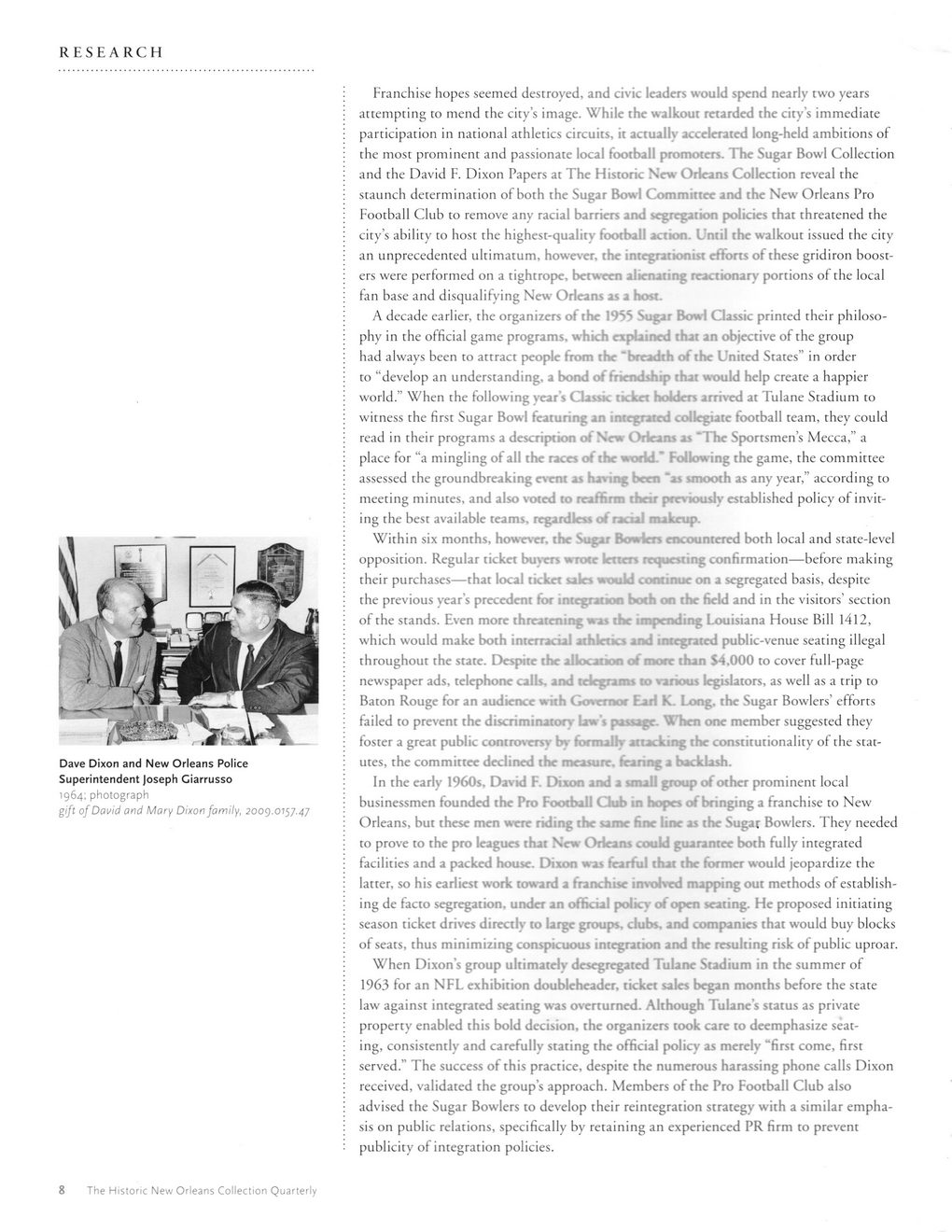This text was obtained via automated optical character recognition.
It has not been edited and may therefore contain several errors.
RESEARCH Dave Dixon and New Orleans Police Superintendent Joseph Ciarrusso 1964; photograph gift of David and Mary Dixon family, 2009.0757.47 Franchise hopes seemed destroyed, and civic leaders would spend nearly two years attempting to mend the city’s image. While the walkout retarded the city’s immediate participation in national athletics circuits, it actually accelerated long-held ambitions of the most prominent and passionate local football promoters. The Sugar Bowl Collection and the David F. Dixon Papers at The Historic New Orleans Collection reveal the staunch determination of both the Sugar Bowl Committee and the New Orleans Pro Football Club to remove any racial barriers and segregation policies that threatened the city’s ability to host the highest-quality football action. Until the walkout issued the city an unprecedented ultimatum, however, the integral ion ist efforts of these gridiron boosters were performed on a tightrope, between alienating reactionary portions of the local fan base and disqualifying New Orleans as a host. A decade earlier, the organizers of the 1955 Sugar Bowl Classic printed their philosophy in the official game programs, which explained that an objective of the group had always been to attract people from the '‘breadth of the United States” in order to “develop an understanding, a bond of friendship that would help create a happier world.” When the following year’s Classic ticket holders arrived at Tulane Stadium to witness the first Sugar Bowl featuring an integrated collegiate football team, they could read in their programs a description of New Orleans as "The Sportsmen’s Mecca,” a place for “a mingling of all the races of the worfd.* Following the game, the committee assessed the groundbreaking event as haring been smooth as any year,” according to meeting minutes, and also voted to reafferts theu previously established policy of inviting the best available teams, regardless c£ racial makeup. Within six months, however, the Sugar Bowlers encountered both local and state-level opposition. Regular ticket buyers wrote letters requesting confirmation—before making their purchases—that local ticket sales would continue on a segregated basis, despite the previous year’s precedent for integration both on the field and in the visitors’ section of the stands. Even more threatening was the impending Louisiana House Bill 1412, which would make both interracial athletic* and integrated public-venue seating illegal throughout the state. Despite the allocation of natt than $4,000 to cover full-page newspaper ads, telephone calls, and telegrams co various legislators, as well as a trip to Baton Rouge for an audience with Governor Earl K. Long, the Sugar Bowlers’ efforts failed to prevent the discriminatory law's passage. When one member suggested they foster a great public controversy by formally attacking the constitutionality of the statutes, the committee declined the measure, fearing a backlash. In the early 1960s, David F. Dixon and a small group of other prominent local businessmen founded the Pro Football Qub in hopes of bringing a franchise to New Orleans, but these men were riding the sar~e fine line as the Sugar Bowlers. They needed to prove to the pro leagues that New Orleans could guarantee both fully integrated facilities and a packed house. Dixon was fearful that the former would jeopardize the latter, so his earliest work toward a franchise involved mapping out methods of establishing de facto segregation, under an official policy of open seating. He proposed initiating season ticket drives directly to large groups, dubs, and companies that would buy blocks of seats, thus minimizing conspicuous integration and the resulting risk of public uproar. When Dixon’s group ultimately desegregated Tulane Stadium in the summer of 1963 for an NFL exhibition doubleheader, ticket sales began months before the state law against integrated seating was overturned. Although Tulane’s status as private property enabled this bold decision, the organizers took care to deemphasize seating, consistently and carefully stating the official policy as merely “first come, first served.” The success of this practice, despite the numerous harassing phone calls Dixon received, validated the group’s approach. Members of the Pro Football Club also advised the Sugar Bowlers to develop their reintegration strategy with a similar emphasis on public relations, specifically by retaining an experienced PR firm to prevent publicity of integration policies. 8 The Historic New Orleans Collection Quarterly

New Orleans Quarterly 2014 Fall (10)